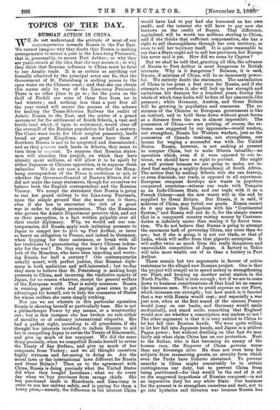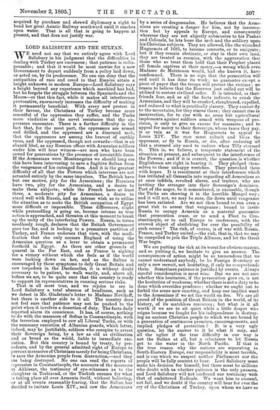TOPICS OF THE DAY.
RUSSIAN ACTION IN CHINA.
WE do not understand the attitude of most of our contemporaries towards Russia in the Far East. We cannot imagine why they doubt that Russia is making arrangements to secure a port in the Liau-tung Peninsula, that is, presumably, to secure Port Arthur ; or why they are panic-struck at the idea that she may secure it ; or why they think that Russian influence in China must be fatal to our Asiatic trade. It is as certain as anything not formally admitted by the principal actor can be, that the Government of St. Petersburg is seeking access to the open water on the Chinese coast ; and that she can obtain this access only by way of the Liau-tung Peninsula. There is no other place to go to ; for the ports on the Gulf of Pechili are none of them free from ice in bad winters ; and nothing less than a port free all the year round will secure the success of the scheme for making the Trans-Siberian Railway the outlet of Asiatic Russia to the East, and the centre of a grand movement for the settlement of South Siberia, a vast and fertile land which, if open to settlement, would clear off the overspill of the Russian population for half a century. The Czars want lands for their surplus peasantry, lands broad as great Kingdoms, and must have them if Southern Russia is not to be congested and discontented ; and as they possess such lands in Siberia, they mean to turn them to account. To suppose that Russian states- men will abandon this project, on which they have already spent millions, or will allow it to be spoilt by either Japanese or Chinese opposition, is to suppose them imbeciles. We do not care a straw whether the Hong- kong correspondent of the Times is credulous or not, or whether the Governor-General of Eastern Siberia did or did not make the same statement, though for ourselves we believe both the English correspondent and the Russian Viceroy. We accept the statement that Russia is going to run her grand railway to the Liau-tung Peninsula, upon the simple ground that she must run it there, even if she has to encounter the risk of a great war in order to obtain permission. That the Russians who govern the Asiatic Department perceive this, and act on their perception, is a fact written palpably over all their recent diplomacy. Why, we would ask our con- temporaries, did Russia apply such irritating pressure to Japan to compel her to give up Port Arthur, or incur so heavy an obligation to France, and indeed to Germany, when begging for their assistance, or break with all her traditions by guaranteeing the heavy Chinese indem- nity for the war ? Do they suppose it was all done for love of the Manchus, who have been impeding and worry- ing Russia for half a century ? Our contemporaries usually assert, with perfect justice, that Russian diplo- macy is both ambitious and self-interested ; but to-day they seem to believe that St. Petersburg is making huge presents to China, and incurring the vindictive enmity of Japan, for no reason 'whatever, except the general welfare of the European world. That is surely nonsense. Russia is running great risks and paying great sums to get advantages for herself, not to help the commerce of States for whose welfare she cares simply nothing. Nor can we see wherein in this particular operation Russia is showing herself so particularly base. She is not a philanthropic Power by any means, or a trustworthy one ; but in this instance she has broken no rule either of morality or of ordinary international etiquette. She had a perfect right, according to all precedents, if she thought her interests involved, to induce Europe to aid her in compelling Japan to revise the Treaty of Simoneseki, and give up much of her conquest. We did the same thing precisely, when we compelled Russia herself to revise the Treaty of San Stefano, and give up much of her conquests from Turkey ; and we all thought ourselves highly virtuous and far-seeing in doing so. Are the moral laws or the international laws different for Russia and Great Britain? Then as to the agreement with China, Russia is doing precisely what the United States did when they bought Louisiana ; what we do every day when we buy provinces from savage chiefs. She has purchased lands in Manchuria and Liau-tung in order to run her railway safely, and is paying for them a heavy price,—namely, the difference in the interest China would have had to pay had she borrowed on her own credit., and the interest she will have to pay now she borrows on the credit of Russia. That difference, capitalised, will be worth ten millions sterling to China, and if she thinks that sufficient compensation, she has a right to sell thoroughfares through her own territory, or even to sell her territory itself. It is quite reasonable to say that a State ought not to sell her provinces, but Europe has never said it yet. How did we come by Cyprus ?
But we shall be told that, granting all this, the advance of Russia to Port Arthur is most dangerous to British interests. Why is it dangerous ? Because, it is said, Russia, if mistress of China, will be so immensely power- ful. We entirely doubt the statement. The assimilation of China is too great a feat even for Russia, and if she attempts to perform it, she will lock up her strength and embarrass her finances for a hundred years, during the whole of which time India will be free of her anaconda-like pressure ; while Germany, Austria, and Great Britain will be growing in population and resources. The re- sistance of the Chinese to European government is like an instinct, and to hold them down without great forces at a distance from the sea is almost impossible. The possession of China—we are putting, of course, the ex- treme case suggested by our opponents—would weaken, not strengthen, Russia for Western warfare, just as the possession of Canada weakens, not strengthens, our means for waging a successful war with the United States. Russia, however, is not seeking at present to conquer China, but to make Siberia valuable,—an operation which, even if it were opposed to our in- terest, we should have no right to prevent. She might as well protest because we are going to make, are in- deed fast making, a mighty dependency of South Africa. The notion that by making Siberia rich she can destroy, or even diminish, our trade, is opposed to all experience. European conquest develops new wants in populous conquered countries—witness our trade with Tonquin as an Indo-Chinese State, and our trade with it as a. French Colony—and the new wants will in the end be supplied by Great Britain. But Russia, it is said, if mistress of China, may forbid our goods. Russia cannot do it any more than Napoleon with his " Continental System," and Russia will not do it, for the simple reason that in a conquered country raising money by Customs- duties is infinitely easier than raising it by direct taxa- tion. We do not believe that Russia is going to attempt the enormous task of governing China, any more than we are ; but if she is going, it is not our trade, or that of India, which will suffer from that gigantic enterprise. It will suffer twice as much from the really dangerous and unavoidable competition of Japan. A factory in Tokio will take more wealth out of us than a battery in Port Arthur.
There remain but two arguments in favour of active resistance to the alleged new Russian project. One is that the project will compel us to spend money in strengthening our Fleet, and keeping up another naval station in the North Pacific. That is true enough ; but if we are to come down to business considerations of that kind let us reason like business men. We are to avoid expense on our Fleet, which increases our strength ; but how much is it fancied that a war with Russia would cost ; and especially a war just now, when at the first sound of the cannon France would jump on our backs, and Germany would smile sardonically, and stand aside, remarking that England would now see whether a conscription was useless or not ? The other argument is that it is very unkind to China to let her fall into Russian hands. We were quite willing to let her fall into Japanese hands, and Japan is a pitiless Pagan power ; but without dwelling on that fact we may fairly ask what claim China has on our protection. Next to the Sultan, who is fast becoming an enemy of the human race, the Emperor of China governs worse than any Sovereign alive. He does not even keep his subjects from massacring guests, an atrocity from which even the Turks have hitherto abstained. To prevent anarchy in China might conceivably be in certain contingencies our duty, but to prevent China from being partitioned—for that would be the end of it all on the suggested hypothesis of Russian conquest—is not an imperative duty for any white State. Our business for the present is to strengthen ourselves and wait, not to go into hysterics and threaten war because Russia has acquired by purchase and shrewd diplomacy a right to bend her great Asiatic Railway southward until it reaches open water. That is all that is going to happen at present, and that does not justify war.



















































 Previous page
Previous page